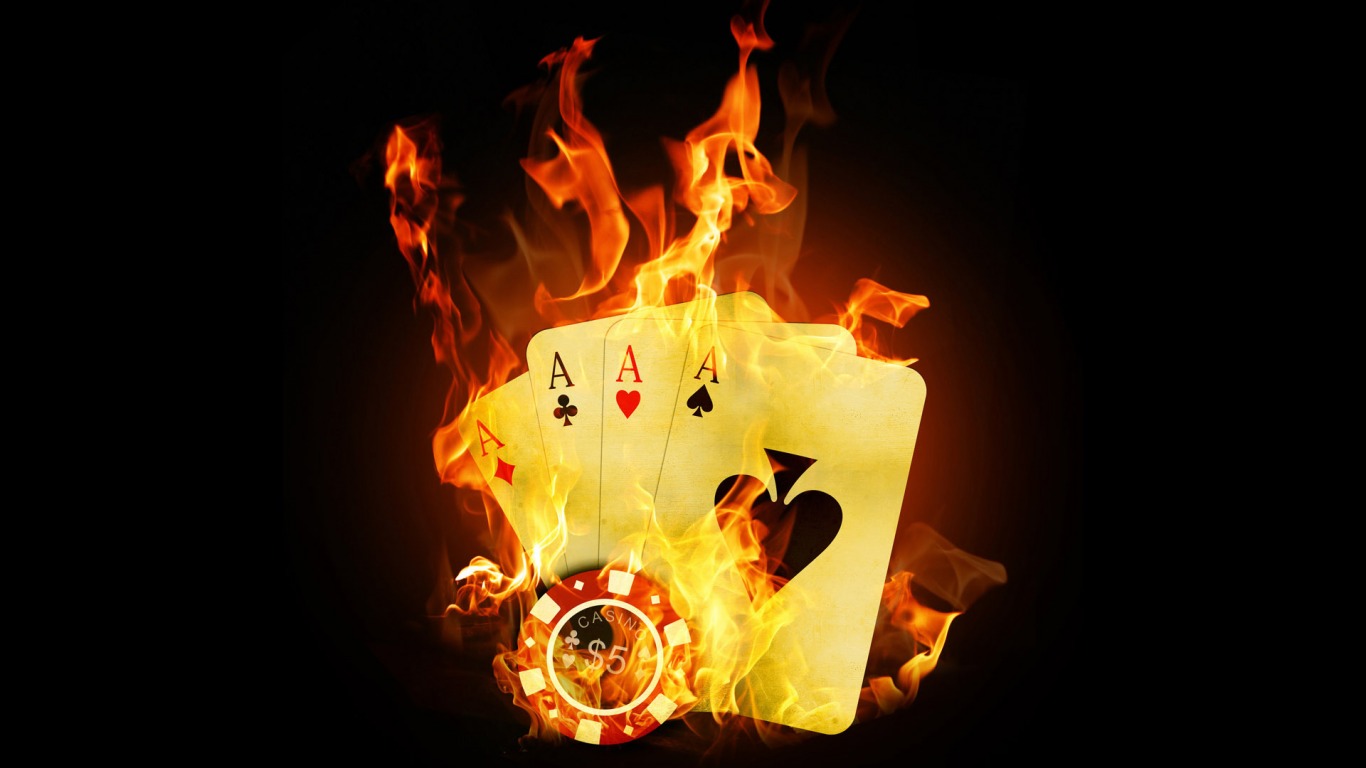
Poker players seem obsessed with the strategy, the technical side of the game, video strategy, lines to take against such and such type of player, good times to bluff, good times to check-call light, the game blinds, play button, the fact swinging his range against regular, etc.. Obviously, all these technical aspects of the game are important. But all these aspects are generally well controlled with good poker players. By cons, all players who have a good technical game are not necessarily winning players. Learn to play poker does not mean that we always play good poker (the lack of consistency is a big "leak" in poker).
You can talk for hours with a poker player who has a very advanced technical game and you will find that this player is solid (and you may think it is a winning player). However, on a poker table in the long term, it will lose.
Why? Because the most important to me to be successful at poker point is always playing his A-game (can never stress enough on this point). All players know that the tilt is bad. All players tiltent to different degrees. But rare are those who understand the crucial importance of playing his A-game at all times.
Tilt management is an essential quality
All the best poker players have this in common: they are rational and manage their emotions well. This is the most difficult that a player will have to work. Yes, these players also have a strong technical game, but what differentiates the most losing players and discipline to always play their best possible poker.
In one month of work, we can come to perfectly master the game blinds (or at least, to have a strong enough base to beat our limit). In no time, we can better understand the importance of playing a lot of hands on bonton and how to successfully play these hands. It can be great to read his opponents and understand the theoretical best game possible. All technical work is well learned by anyone able to complete a secondary 5. But one point more or less related to intellectual capacity and is self-control, control of emotions at a table poker.
It is amazing how many discussions I had with members of PokerCollectif where the player said: "I am a winning player you know, but I have many problems and tilt it I often lose my winnings the time I tilted. If it was not tilt, I would really win. " Unfortunately, we can not see it that way. It's like saying: "If it was not the time I play my small blind and big blind my, I would be a winning player." All these aspects have and should excel everywhere.
If you win $ 2000 in 3 weeks "grind" intense and you "spew" $ 2,500 last week because you start "runner bad", you're a losing player. Yes, you can beat the game, YES, you understand the game better than your opponents, but you do not have control over you and therefore you remain a losing player.
Here, so let me give you some tips to play your A game as often as possible. Note that for some, the work will be easier than for others. But know that it is especially extremely important work and it will be better than any mathematical formula to calculate the odds.
Some books that deal with tilt
I am not of course the first to broach the subject of tilt. For several years, authors such as Tommy Angelo and Jared Tendler became interested in this topic.
I invite you, if it is not already, to study these structures.
"Elements of Poker" Tommy Angelo will offer you simple exercises to stay calm in times of panic. Visualization exercises and breathing. Then you can study "The Mental Game of Poker" Jared Tendler. A critical review of the book is available here: http://www.pokercollectif.com/Divers/the-mental-game-of-poker-jared-tendler-tilt.html
The goal is to change his way of seeing things. The player who suffers a bad beat bad beat sees as absurd, "I made one outer in a huge pot, it is absurd, so I tilt". The goal is to collect the tilt as absurd. Why tilter when you lose a flip? Earning 95% of flips would be absurd and not the fact of losing 1 to 2.
Other excellent books have also been published on the tilt and although not all are as good, I do not read bad, so you are free to read if the subject interests you.
Some tips
As a complement, I'd give you some tips to control your tilt or to help you your A-game player as often as possible.
The first important thing to control its tilt is well known. Are you calmer in the morning after a night's sleep or evening? Are you calmer after dinner or before noon? Thoroughly know will ensure that we will get the best possible not tilter provisions and we play when our mind is at its best when making decisions. If you play poker while returning from a bar, it is possible that your patience and concentration are diminished and consequently, your tendency will be larger tilter. In other words, anything that causes you to play your B and your C game is a factor that encourages the tilt. Some people play the 4-5 morning after drinking coffee. How coffee is it you? You become hyper active and more prone to tilt? Have you higher as you Line up coffee cups VPIP? After eating a large meal, you become less attentive and more asleep?
I started losing sessions are
I have read several times the following comment: "Looks like my sessions always begin with the loss of 2-3 buy-ins Then I bounced back and I regain the lost money Looks like I need to.. lose a few buy-in before taking the game seriously. Seems like I run more bad beginning of the session. "
If this is your case, you should consider the option to warm up otherwise (less expensive) before starting to play. This is the same principle with tennis for example, or any other sport. You return to the ground after 1 week of rest and the first few minutes, you are less alert, slower, less "in the mood". After some discussion, you take a leisurely pace and you are at your best. On a tennis court, "you" warmed beat the "you" unprepared.
Warming may also be necessary when playing poker. To do this, you can open 4 tables and watch the players from your limit. Ask yourself questions, train your brain to be on a poker table. View 4 fast coolers and imagine that it could happen to you. Prepare for bad runner, because it is a possibility. When you're in the mood, you start to play and it is as if it was already one hour you play it. Do not play poker if you do not feel "in the mood". Another positive point is the fact that consistently lose 2-3 buy-in early in the session may tiltant, If you start immediately to play your A-game, the chances of losing buy-ins will be less broad and Therefore, the chances of tilter will be too.
Meanwhile study, enjoy watching him play for example the biggest winners of your limit and make notes on them when you see showdowns. Also note how they played their hand against any player. Try to see if your opponents have the same sizing when bluffing when that value bet. It is here only two examples of 1000 points that you can study.
Small details in a table can be tiltant. Not everyone will agree with me, but the fact of all in a railer is harmful for players who tend to tilter. If you are multi-tabling and you callez an all in with a hand that is in front of the ranks of your opponent, the wait cards that will fall on the board will not work. It can be even more frustrating.
You are all in with AK against QQ and you've hit a flop! You are smiling and confident. The K on the turn strengthens your sense of winning the hand and the river is a Q. You then feel like you are actually 2 outer.
From a rational and logical side, you lose on QQxxx on 4569T or AAKQQ does not change the fact that you lost the hand. But if this kind of details you tilt, it is probably better not to look at the results. You can do it later with your tracker when ye shall see hands. Ignoring the hand of your opponent completely is a mistake, do not make me say what I did not say! But wait until the end of your session if it is better for you.
Other details; when you take a close early in the session and you hesitate a lot between a call or fold decision, you may are better folder. Obviously, some coaches will tell you caller since a bad fold is often more expensive than a bad call and in addition, you get information about your opponent's hand, but if the caller makes and not have the best hand to tilt the remainder of the session, go to the fold (I repeat, when it is tight and that the EV of a call or fold you think is equal). For folder, you must have a lot of information on your opponent to take this situation is neutral EV.
Another important point that comes to mind when you play against players who multi-table at fairly low limits (around NL100 and below), do not engage in wars not too meta-game. For example, you play against a regular multi-table that you open your button, you 3bet the big blind, you foldez. The next time you're on the button opens and you still 3bet. At this stage, you can start paranoid and say that your opponent is backing you because he considers you open too many buttons. It is possible and many regular good will exploit you in this way. But before making a light 4bet or attempting caller 3bet and floater with J7o, make sure that this is a player who thinks far enough that there is a metagame. I often see players attempt to 4-bet bluff with AT, be 5bet raiser all in and say they have caller and face KK or AA. This is obviously something frustrating and can generate tilt. But know that many players will play their two cards without too much regard for history. Probably these were 10,000 regular hands on you and that you just opened twice a hand button will not change your range to ous. In short, know your opponents before drawing conclusions too quickly. In the same vein, do not set too quickly intelligence and skills to your opponents; it may be another factor tilt. Make a good fit on a poker table is an intelligent behavior, and only a small percentage of players who are able to make these adjustments.
Another example: You play a hand against a "fish" and you say that the line does not make sense (for example, a very large check-raise the flop paired and dry) and you say something like "I don ' have no choice of caller, the line does not make sense, it is probably bluffing. " If you are looking for the meaning of each game on a poker table, you have it for life to understand nothing. In this case, the game will default to folder and move to another hand. Do not try too much war "leveling" with this type of players because they necessarily eventually you tilter. I'm not saying never to play, I'm just saying be careful when drawing conclusions.
Link between A-game and tilt
Does not play his A-game makes you more likely to lose money. Losing money can generate tilt. Before each session, you should have a "stop loss", that is to say an amount that you give the right to lose before leaving the session. Stick to that amount! Anyway, even if you played well and lost 8 buy-in, rest assured that even if you continue your session, you will not play your A-game and you should probably take a break of at least 24 hours. Some players are able to disregard a bad sequence if they know they played well, but it is the case of too few players. If you do not follow the "stop loss", you can lose even more, be more tilted and play worse. See these situations as challenges. Tell yourself that if you're not able to stop your session after losing 8 or 10 buy-in, you do not have all the necessary qualities to become a good poker player. Discipline is very important in poker and at many levels. Learn to leave a session at the right time is an important quality in a poker player, as well as check-raise in the right situations. Must be able to accurately judge his state of mind. I'm currently playing my A-game? Must know how to respond objectively.
Objective and critical self
Last important point: always doubt yourself. I think it is here that many players fail. They believe strong and winners. They multi-table for months and months and end up being losers. Tiltent these losses and these players play worse than before. If you believe that you are winners and losers in reality, you probably will shout loud and clear that you "runnez bad". And who says "run bad" says "tilt".
The failure to recognize that our failures are due to lack of competence you will tilter. Be always honest with yourself and if you are unsure, take a good coach for only one hour, even if you think you're as good as him. This person (preferably deemed and considered solid poker) can give you an objective opinion on your game and can tell you if your losses are caused by lack of skill or run bad. If you do not have the tools to beat the regular of your limit, you stop putting all the blame on bad luck and you stop tilter thereby. This is when you will start working your game seriously to become winner.
Self-control is the exercise of a lifetime. Some people are genetically predisposed to a better dealer with tilt, but I think every person who invests and has enough willpower will eventually have good control of herself on the poker tables.
We hope that these notes will give you food for thought. Do not forget to read (and reread) the books suggested above!
Discuss this article on the forums tilt PokerCollectif: Some tips to control its tilt
Author: Kidam




